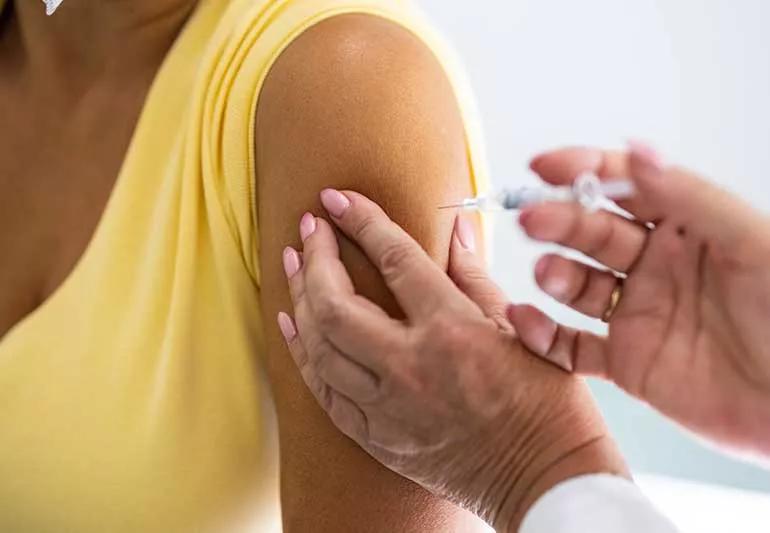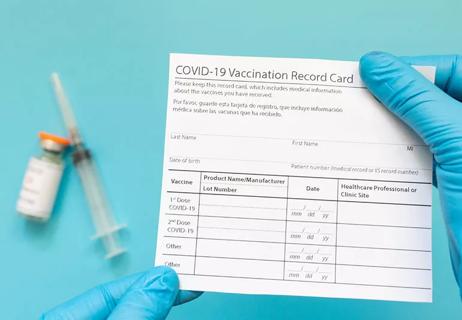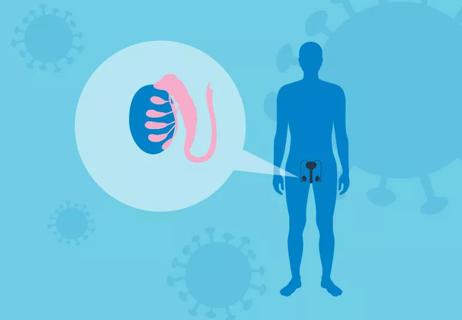Irregularities in cycle length and flow aren’t a cause for concern

After being vaccinated against COVID-19, many people reported symptoms like swollen lymph nodes and “COVID arm.” These reactions can be concerning, as many of us have never experienced them before. Some of the side effects reported appear to be associated with your body’s immune response to the vaccine. But what about the reports of altered menstrual cycles after vaccination?
Advertisement
Cleveland Clinic is a non-profit academic medical center. Advertising on our site helps support our mission. We do not endorse non-Cleveland Clinic products or services. Policy
The evidence that COVID-19 vaccines can have a direct effect on menstrual cycles is still evolving. That said, several studies have shown an association between the vaccines and menstrual changes. Experts suggest that those changes are also likely due to your body’s immune response, and aren’t a cause for concern.
Ob/Gyn George Fyffe, MD, FACOG, shares his insight about why this might be happening.
Talk about the connection between vaccination and menstruation has been happening since COVID-19 vaccines became available.
Interest grew following the publication of four different studies. Two examined the relationship between the vaccines and periods (also known as menses). The other two looked at the relationship between the vaccines and the entire menstrual cycle.
Then, in June 2023, the National Institutes of Health (NIH) released the results of a fifth study. The data came from a broader project: Boston University’s Pregnancy Study Online, also known as PRESTO. The sample size of the PRESTO study was small, but all of the participants were attempting to conceive at the time. In other words: None of the people studied were using any kind of birth control. That made the data the researchers analyzed “cleaner” than it was in previous studies.
Advertisement
We’ll start by talking about menses: The period itself.
A study published in Science Advances in April 2022 shared the results of a survey about menstrual bleeding following COVID-19 vaccination. Of the 16,000 menstruating people who responded, 42% reported bleeding more than they usually do during their period.
Interestingly, women who don’t menstruate — either because they’re post-menopausal, on certain long-term contraceptives or taking hormone therapy — also reported breakthrough or otherwise-unexpected bleeding.
42% is an eye-popping number. It’s also probably inaccurate. That’s because your more likely to respond to a web-based survey about your menstrual cycle if you’ve noticed something unusual about it. The findings of a January 2022 study out of Norway were less dramatic, with only 13% of respondents reporting a heavier-than-normal flow.
The picture became a bit clearer in June 2023, when the PRESTO study analysis found no significant relationship between COVID-19 vaccination and heavy menstrual flow. They didn’t find a relationship between vaccination and menstrual pain either.
To be clear: None of the three studies were designed to establish a cause-and-effect relationship between COVID-19 vaccines and menses. The studies were purely observational. We need more research to know for certain whether COVID-19 vaccines impact menstrual flow or pain.
So, you may have a heavier period after your COVID-19 vaccine. But what about the whole menstrual cycle? Can the jab affect that, too?
In July 2022, Obstetrics and Gynecology published a study that showed a small increase in the length of menstrual cycles following COVID-19 vaccination. In September 2022, an NIH-funded international study confirmed that finding. The 2023 PRESTO study data analysis had similar results as well.
Put together, the current research suggests that COVID-19 vaccination was associated with a small (about one day) increase in menstrual cycle length. That increase appears to only effect the first period you have after getting the vaccine.
While we traditionally think of the menstrual cycle as a 28-day-long thing, variation is completely normal. Most healthcare providers tend not to worry about cycle variation unless it’s greater than eight days.
As was the case with the studies on COVID-19 vaccination and menses, these findings are observational. That means they can’t tell us why the vaccine is impacting menstrual cycle length. Lucky for us, doctors already know enough to venture a theory explaining these findings.
You might not realize that there’s a connection between your uterus and immune system, but there is. Dr. Fyffe says that as you’re about to ovulate, your immune system ramps itself up to prevent anything from interfering with fertilization and implantation of the egg. Once the egg is fertilized and implants, your immune system goes down again, in order to accept the pregnancy.
Advertisement
According to Dr. Fyffe, the lining of your uterus also has immune cells. Those cells can be affected by hormonal changes.
“Your hypothalamus in your brain is the hormonal control center,” he explains. “It works with your anterior pituitary gland. Together, they send messages, in the form of hormones, to your ovaries and uterus. Those messages tell your ovaries to increase or decrease hormone levels to facilitate ovulation, pregnancy or — if fertilization doesn’t occur — the return of your menstrual cycle. Those same messages impact your immune system, too.
“Emotional stress, physical stress and chemical stress can all affect the hormonal control center, which can result in menstrual cycle changes,” he adds.
Getting a vaccine qualifies as a form of chemical stress, but that doesn’t make it dangerous. Changes to your period are a sign your immune system is responding, which is, of course, the goal of vaccination.
In most cases, post-vaccination period changes are minor and shouldn’t cause concern. If you’re noticing a serious disruption in your cycle or significant changes to your menses, talk to a healthcare provider. Dr. Fyffe says you and your healthcare provider can work together to determine the best course of action.
Advertisement
Bottom line: COVID-19 vaccinations remain safe, effective and important to our collective health. So you can roll up your sleeve confident that any period-related side effects will be short term.
Advertisement
Learn more about our editorial process.
Advertisement

Updated vaccinations are recommended to better protect against the evolving virus

Redness, swelling, itching and rash can happen when your body’s immune system reacts to the vaccine injection

Before you panic, here are the options to consider

Just one more myth to add to the misinformation pile

Our expert explains why swollen lymph nodes happen

Cravings are a natural response to hormonal changes, but giving into them may make you feel worse

It’s important to angle it toward your rectum or back, along the natural curve of your vaginal canal

To help manage symptoms, switch to more absorbent period products, make healthy lifestyle changes and explore treatment options

The tropical fruit is a good source of antioxidants and vitamin C

Most people fall asleep within 10 to 20 minutes, but if your experience is different, adjusting your sleep schedule may help

Exploring your hidden side can lead to better understanding of what makes you tick